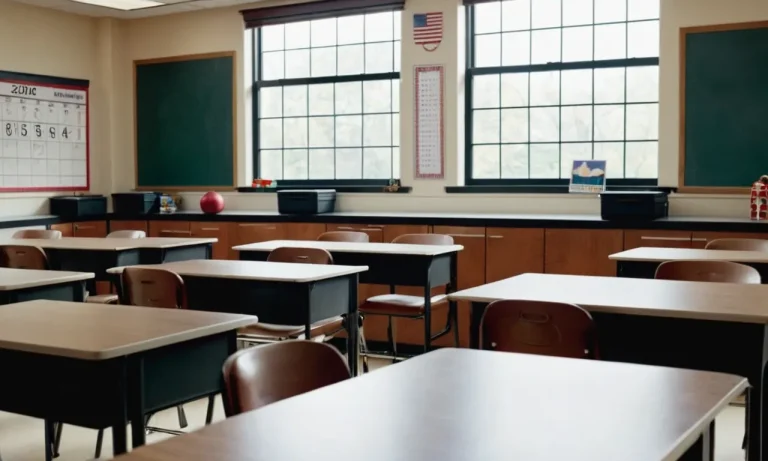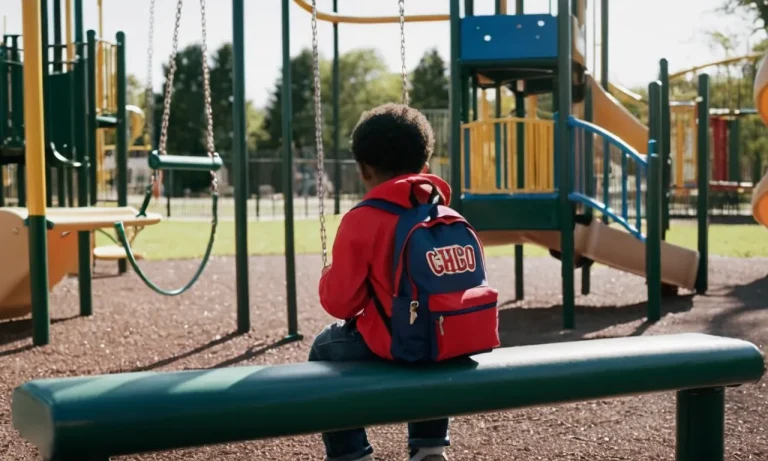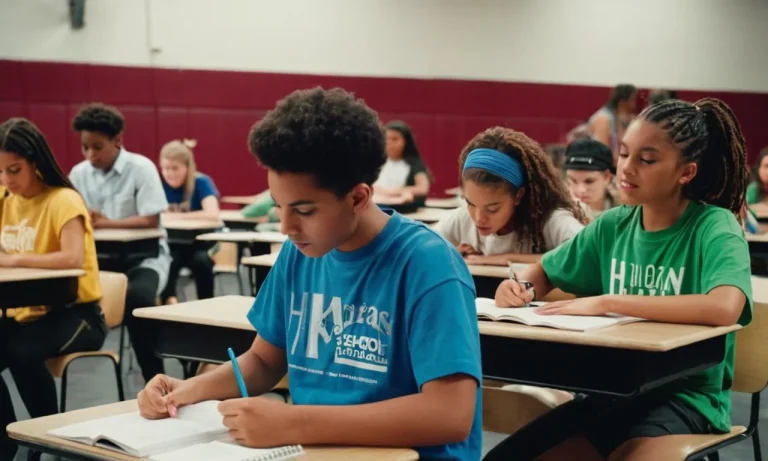Failing finals in high school can be a daunting experience, leaving students and their families with a mix of emotions and uncertainties about the future.
If you’re short on time, here’s a quick answer to your question: Failing finals in high school can result in various consequences, such as having to retake the course, being held back a grade, or potentially not graduating on time.
However, the specific outcomes may vary depending on the school’s policies, the number of failed courses, and the student’s overall academic performance.
In this comprehensive article, we’ll explore the potential implications of failing finals, the options available to students, and the steps they can take to get back on track. We’ll also discuss strategies for preventing academic setbacks and ensuring a successful high school journey.
Understanding High School Final Exams
What are final exams?
Final exams, also known as semester or year-end exams, are comprehensive assessments that evaluate a student’s understanding and mastery of the material covered throughout an entire course or academic year.
They are typically administered at the end of a semester or school year and carry significant weight in determining a student’s overall grade and academic performance. Unlike regular tests or quizzes, final exams cover a broader range of topics and concepts, making them a crucial measure of a student’s cumulative knowledge and skills.
The importance of final exams in high school
Final exams play a vital role in the high school education system for several reasons:
- They encourage students to review and consolidate their learning from the entire course, promoting better retention and understanding of the material.
- They serve as a comprehensive evaluation of a student’s academic progress and achievements, providing valuable feedback to both students and teachers.
- Strong performance on final exams can positively impact a student’s overall grade point average (GPA), which is crucial for college admissions and scholarship opportunities.
- Preparing for and taking final exams helps students develop essential skills such as time management, study habits, and test-taking strategies, which are invaluable for their future academic and professional pursuits.
According to a study by the National Center for Education Statistics, over 80% of high schools in the United States administer final exams or similar comprehensive assessments, highlighting their widespread importance and acceptance.
Grading policies and passing requirements
Grading policies and passing requirements for final exams can vary depending on the school district, state, or individual high school. However, some common practices include:
- Final exams typically account for a significant portion of a student’s overall course grade, often ranging from 20% to 30% or more.
- Students must achieve a minimum passing score on the final exam, usually set by the school or district, to pass the course and earn credit.
- Some schools may offer alternative assessment options or retake opportunities for students who fail to meet the passing requirements on their first attempt.
It’s essential for students and parents to familiarize themselves with their school’s specific grading policies and passing requirements for final exams. Many schools provide this information in their student handbooks or on their official websites, such as California Department of Education’s High School Assessment Information.
By understanding the significance of final exams and the grading policies surrounding them, students can better prepare and prioritize their studies, ensuring they meet the necessary requirements for academic success and progression in high school.
Consequences of Failing Finals
Failing finals in high school can have significant consequences that may impact a student’s academic journey and future prospects. The repercussions can vary depending on the specific school’s policies and the severity of the situation. Here are some potential outcomes:
Retaking the course
One of the most common consequences of failing a final exam is the need to retake the course. This means the student must enroll in the same class again, either during summer school or the following academic year.
Retaking a course can be a time-consuming and costly endeavor, especially if it delays graduation. According to the National Center for Education Statistics, approximately 6% of high school students repeat a grade each year, often due to failing courses.
Grade retention
In some cases, failing a final exam or multiple courses may result in grade retention, meaning the student will have to repeat the entire grade level. This can be a significant setback, both academically and emotionally.
Grade retention can also have long-term implications, as students who are held back are more likely to drop out of high school, according to a study by the Education Week.
Impact on graduation requirements
Failing a final exam or course can jeopardize a student’s ability to meet the graduation requirements set by their school district or state. Most high schools have specific credit requirements that must be fulfilled to receive a diploma.
Failing a core subject, such as math or English, can make it challenging to accumulate the necessary credits on time. According to the National Center for Education Statistics, the average high school graduation rate in the United States was around 85% in 2019.
Potential effects on college admissions
For students planning to attend college, failing finals or courses can negatively impact their chances of admission, especially at competitive institutions. College admissions officers closely examine an applicant’s academic record, including grades, test scores, and course rigor.
Failing a course or having a low GPA can raise red flags and potentially hinder a student’s chances of being accepted into their desired college or university. According to a survey by the National Association for College Admission Counseling, over 80% of colleges consider a student’s grades to be of “considerable importance” in the admissions process.
It’s crucial for students to take finals seriously and seek academic support if they are struggling in a particular subject. Early intervention and open communication with teachers and counselors can help mitigate the potential consequences of failing finals and ensure a successful academic journey.
😊
Options and Remedies for Students
Failing finals in high school can be a stressful and disappointing experience, but it’s not the end of the world. There are several options available to help students get back on track and recover the credits they need to graduate. Let’s explore some of these remedies:
Credit recovery programs
Many high schools offer credit recovery programs, which allow students to retake the failed course or complete alternative assignments to earn the necessary credits. These programs can be completed during the regular school year or over the summer break.
According to a study by the EdWeek Research Center, approximately 70% of high schools in the U.S. offer credit recovery programs, with 88% of these programs being online or blended learning models.
Summer school
Summer school is a popular option for students who need to retake a course or make up missed credits. These intensive programs typically run for several weeks during the summer break, allowing students to focus solely on the subject they need to pass.
According to data from the National Center for Education Statistics, around 8% of high school students attend summer school each year, with the majority doing so to retake a failed course or recover credits.
Online courses
With the rise of online education, many high schools now offer virtual courses that students can take to recover credits or retake failed classes. These online courses are often self-paced and can be completed at the student’s convenience, making them a flexible option for those with busy schedules.
According to EdWeek, online credit recovery programs have seen a surge in popularity in recent years, with many schools adopting them as a cost-effective and accessible solution.
Appealing the decision
In some cases, students may have grounds to appeal their failing grade or the decision to withhold credits. This could be due to extenuating circumstances, such as illness or family emergencies, that impacted their performance.
The appeal process varies from school to school, but it typically involves submitting a formal request to the school administration, along with supporting documentation. If the appeal is successful, the student may be able to retake the final exam or have their grade reevaluated.
However, it’s important to note that appeals are not always granted, and students should explore other remedies as well.
Regardless of the option chosen, it’s essential for students to stay motivated and focused on their academic goals. Failing finals can be a setback, but it’s not an insurmountable obstacle. With determination and the right support, students can recover the credits they need and continue on their path to graduation.
😊
Strategies for Academic Success
Developing effective study habits
Cultivating effective study habits is a game-changer when it comes to academic success. Start by creating a dedicated study space that is free from distractions, and establish a consistent routine. Break down your study sessions into manageable chunks, with regular breaks to recharge.
Experiment with different techniques, such as the Pomodoro method (25 minutes of focused work followed by a 5-minute break) or active recall strategies like creating flashcards or quizzing yourself. According to a study by the American Psychological Association, students who engage in active learning techniques tend to retain information better and perform better academically.
Don’t be afraid to mix things up and find what works best for you! 😎
Time management techniques
Mastering time management is a superpower for high school students juggling multiple classes, extracurricular activities, and social commitments. Start by creating a weekly schedule that blocks out time for studying, assignments, and other obligations.
Prioritize tasks based on importance and deadlines, and don’t forget to schedule breaks and fun activities to avoid burnout. Consider using productivity apps or planners to stay organized and on track. According to a study by researchers at the University of Bari, students who practice effective time management techniques tend to have higher GPAs and lower levels of stress.
Remember, time management is a skill that takes practice, so be patient with yourself and celebrate small wins along the way! 🎉
Seeking academic support
Don’t be afraid to ask for help when you need it! Seeking academic support can be a game-changer, whether it’s attending office hours with your teachers, joining a study group, or working with a tutor.
Many schools offer free tutoring services or peer mentoring programs, so take advantage of these resources. Online platforms like Khan Academy and Coursera also offer a wealth of educational content and resources. Remember, seeking help is a sign of strength, not weakness, and can make a significant difference in your academic journey.
Plus, collaborating with others can make studying more enjoyable and engaging! 👥
Maintaining a positive mindset
Cultivating a positive mindset is crucial for academic success. Start by focusing on your strengths and celebrating your achievements, no matter how small. Surround yourself with a supportive network of friends, family, and mentors who believe in you and encourage you to reach your full potential.
When faced with setbacks or challenges, practice self-compassion and reframe negative thoughts into more constructive ones. According to a study by Stanford University, students with a growth mindset (the belief that abilities can be developed through effort and dedication) tend to perform better academically and have a greater sense of resilience. Remember, your mindset is a powerful tool – embrace it, nurture it, and watch yourself soar!
🚀
Conclusion
Failing finals in high school can be a setback, but it doesn’t have to define your academic journey. By understanding the consequences, exploring available options, and implementing effective strategies, students can overcome this challenge and get back on track toward achieving their educational goals.
Remember, seeking help from teachers, counselors, and support services is crucial when facing academic difficulties. With determination, hard work, and the right mindset, students can learn from their experiences and emerge stronger, better prepared for future academic endeavors.






